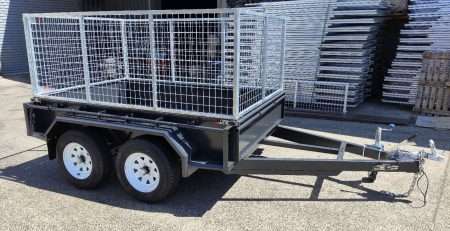
Unlocking Efficiency: The Ultimate Guide to Box Trailer Hitches
Understanding Box Trailer Hitches
Before diving into the world of box trailer hitches, it’s important to have a clear understanding of what they are, their features and construction, as well as their weight ratings and classes.
What is a Box Trailer Hitch?
A box trailer hitch is a type of trailer hitch specifically designed to attach a box trailer to a towing vehicle. It provides a secure and reliable connection, allowing for safe and efficient towing. Box trailer hitches are versatile and can fit square, rectangular, and round trailer tongues, making them suitable for various types of box trailers.
Features and Construction of Box Trailer Hitches
Box trailer hitches are constructed with durability and safety in mind. They are typically made from high-strength steel, ensuring strength and longevity even in demanding towing conditions. The robust design of box trailer hitches provides stability and security, allowing for confident towing.
Weight Ratings and Classes of Box Trailer Hitches
The weight rating of a box trailer hitch refers to the maximum weight it can safely tow. It is crucial to select a box trailer hitch with an appropriate weight rating to ensure safe towing. Box trailer hitches are available in different weight classes, each offering a specific weight capacity. The weight classes typically range from Class 1 to Class 5, with Class 1 having the lowest capacity and Class 5 offering the highest.
To determine the appropriate weight rating for your box trailer hitch, you should consider the weight of your box trailer, including its contents, as well as the tongue weight (the downward force exerted on the hitch). It is important to choose a box trailer hitch that matches or exceeds the towing capacity of your vehicle to ensure safe and efficient towing.
Here is an overview of the weight ratings and classes of box trailer hitches:
| Class | Weight Rating (lbs) |
|---|---|
| Class 1 | Up to 2,000 |
| Class 2 | 3,500 |
| Class 3 | 5,000 |
| Class 4 | 10,000 |
| Class 5 | 12,000+ |
Table based on information from Curt Manufacturing
Understanding the weight rating and class of your box trailer hitch is essential for safe and efficient towing. It ensures that your hitch can handle the weight of your box trailer and provides peace of mind during your towing adventures.
Now that we have a solid understanding of box trailer hitches, it’s time to explore the process of choosing the right hitch for your specific needs.
Choosing the Right Box Trailer Hitch
When it comes to selecting the right box trailer hitch for your towing needs, there are several important considerations to keep in mind. These considerations include towing capacity, matching the hitch to the vehicle and trailer, and the importance of regular maintenance and inspection.
Considerations for Towing Capacity
One of the key factors to consider when choosing a box trailer hitch is the towing capacity of your vehicle. It is crucial to ensure that the hitch you select can handle the weight of your trailer and its cargo. The maximum towing capacity for a box trailer hitch depends on the specific make and model of the vehicle, as well as the weight rating of the hitch itself.
To determine the towing capacity of your vehicle, consult the owner’s manual or contact the manufacturer. It’s important to note that exceeding the towing capacity can put undue stress on your vehicle and compromise safety. Therefore, it is recommended to choose a box trailer hitch that matches or exceeds the towing capacity of your vehicle for optimal performance and safety.
Matching the Hitch to the Vehicle and Trailer
Matching the box trailer hitch to both the towing vehicle and the trailer is essential for safe and efficient towing. The size and weight rating of the hitch should align with the specifications of both the box trailer and the towing vehicle to ensure proper towing capacity and safety.
When selecting a box trailer hitch, consider the following factors:
Gross Trailer Weight (GTW): This is the total weight of the loaded trailer. The box trailer hitch should have a weight rating that matches or exceeds the GTW of your trailer.
Tongue Weight: The tongue of the trailer applies downward pressure to the hitch. It is recommended to choose a box trailer hitch with a minimum tongue load rating of 10% of the gross trailer weight or 200 pounds, whichever is greater (VESC V-5 Minimum Requirements for Motor Vehicle Connecting Devices and Towing Method).
Vertical Load: The box trailer hitch should have a minimum vertical load rating of 300 pounds to ensure stability and safe towing (VESC V-5 Minimum Requirements for Motor Vehicle Connecting Devices and Towing Method).
It is crucial to refer to the manufacturer’s specifications and guidelines to ensure that the box trailer hitch is compatible with both your vehicle and trailer.
The importance of regular maintenance and inspection
Regular maintenance and inspection of your box trailer hitch are essential for safe and efficient towing. Before each towing operation, inspect the hitch for any signs of wear, damage, or corrosion. Ensure that all connections are secure and that the hitch is properly lubricated.
Additionally, it is important to follow the manufacturer’s recommended maintenance schedule for your box trailer hitch. This may include lubrication, tightening of bolts, and periodic inspection by a professional.
By conducting regular maintenance and inspections, you can identify and address any issues before they become major concerns. This helps to ensure the longevity and reliability of your box trailer hitch, as well as the safety of your towing operations.
When choosing a box trailer hitch, carefully consider the towing capacity, matching it to the vehicle and trailer, and the importance of regular maintenance and inspection. By taking these factors into account, you can select a box trailer hitch that meets your needs and provides a safe and efficient towing experience.
Benefits of Box Trailer Hitches
Box trailer hitches offer several benefits that make them a popular choice for individuals and businesses alike. Let’s explore some of these advantages:
Enhanced Cargo Carrying Capacity
One of the primary benefits of using a box trailer hitch is the enhanced cargo-carrying capacity it provides. Box trailers, whether they are utility trailers, enclosed trailers, or cargo trailers, offer ample space to transport various goods and materials. With a sturdy and reliable box trailer hitch, you can safely tow your trailer and carry a significant amount of cargo.
The spacious interior of a box trailer allows for efficient organisation and transportation of items. Whether you’re a small business owner, a transport company, or an individual with hauling needs, a box trailer hitch enables you to transport goods securely and conveniently. This increased cargo capacity is particularly advantageous for moving large or bulky items that may not fit in a standard vehicle.
Easy access and convenience
Compared to other options, such as roof racks or rooftop cargo carriers, box trailer hitches provide easy access and convenience for loading and unloading cargo. Unlike trailers, which often require unloading everything to access specific items, hitch cargo carriers offer waist-level access to gear throughout the trip. This makes it easier and safer to retrieve items during travel, especially for long journeys where frequent access is necessary.
In addition, box trailer hitches allow for quick attachment and detachment of the trailer, providing flexibility and convenience. This makes it easier to switch between towing and everyday driving without the need for extensive setup or removal.
Improved fuel efficiency and weather protection
Using a box trailer hitch can also contribute to improved fuel efficiency. Hitch cargo carriers help maintain the aerodynamic shape of the vehicle, reducing wind resistance and drag. This, in turn, can lead to better fuel economy, especially on long trips.
Furthermore, box trailer hitches provide better weather protection compared to open trailers. Since box trailers are self-contained and offer complete coverage for belongings, they provide enhanced protection against rain, snow, and other external elements. This can be particularly beneficial when transporting delicate or weather-sensitive items that require extra care and protection.
To ensure the safe and efficient use of box trailer hitches, it is recommended to follow proper attachment and safety guidelines. This includes using safety chains, considering weight distribution hitches for heavy loads, and complying with safety standards and labels (Flex Fleet Rental).
In conclusion, box trailer hitches offer numerous benefits, including enhanced cargo carrying capacity, easy access and convenience, improved fuel efficiency, and weather protection. These advantages make them a practical choice for individuals and businesses looking to transport goods efficiently and securely.
Types of Box Trailer Hitches
When it comes to box trailers, selecting the right hitch is crucial for safe and efficient towing. There are different classes of box trailer hitches available, each designed to accommodate specific towing needs. In this section, we will explore the three main classes of box trailer hitches: Class 3, Class 4, and Class 5.
Class 3 Box Trailer Hitches
Class 3 box trailer hitches are commonly used for towing smaller utility trailers, enclosed trailers, and cargo trailers. They offer a balance between towing capacity and versatility, making them suitable for a wide range of towing applications. Class 3 hitches typically have a maximum towing capacity of around 5,000 to 6,000 pounds and a tongue weight capacity of about 500 to 600 pounds (CURT Manufacturing).
These hitches are commonly found on SUVs, trucks, and vans, providing the flexibility to tow various types of box trailers. It’s important to ensure that the hitch is properly installed and compatible with both the vehicle and the trailer. Always refer to the manufacturer’s guidelines and specifications for the specific Class 3 hitch you are considering.
Class 4 Box Trailer Hitches
Class 4 box trailer hitches are designed for towing larger and heavier loads. They have a higher towing capacity than Class 3 hitches, typically ranging from 7,000 to 10,000 pounds. Class 4 hitches also have a higher tongue weight capacity, usually around 700 to 1,000 pounds.
These hitches are commonly used for towing heavy-duty utility trailers, large enclosed trailers, and cargo trailers. They are suitable for hauling larger loads and are commonly found on trucks and full-size SUVs. As with any hitch, it’s important to ensure that the Class 4 hitch is compatible with your vehicle and the weight of the box trailer you intend to tow.
Class 5 Box Trailer Hitches
Class 5 trailer hitches are primarily used for commercial applications and are designed for heavy-duty towing. They have an exceptionally high towing capacity, typically ranging from 18,000 to 20,000 pounds (Hitch House Georgia). Class 5 hitches are extra heavy-duty and are commonly used for hauling heavy loads such as horse trailers, large recreational vehicles, and commercial heavy equipment trailers.
These hitches are typically found on heavy-duty trucks and are engineered to handle the demands of towing substantial weights. Class 5 hitches provide the necessary strength and stability for towing the heaviest box trailers. It’s essential to ensure that your vehicle is equipped with the appropriate Class 5 hitch and that it is installed correctly to ensure safe and secure towing.
When selecting a box trailer hitch, it’s important to consider the towing capacity required for your specific needs. Choosing the appropriate hitch class ensures that your vehicle is capable of safely towing your box trailer. Refer to the manufacturer’s guidelines and consult with a professional if you have any doubts about which class of hitch is suitable for your towing requirements.
Safety and Accessories for Box Trailer Hitches
When it comes to using a box trailer hitch, safety should always be a top priority. Proper attachment and the use of safety chains, as well as the consideration of weight distribution and compliance with safety standards, are essential for a safe towing experience.
Proper Attachment and Use of Safety Chains
It is crucial to properly secure the box trailer to the hitch using safety chains to prevent detachment during transport. Safety chains act as a backup in case the trailer becomes disconnected from the hitch. When attaching the safety chains, they should cross under the trailer tongue to form an X-pattern, allowing them to catch the trailer in case of separation. The chains should be properly adjusted to ensure they are not dragging on the ground while providing enough slack for turns. Regular inspection of the chains for wear and damage is also important to maintain their effectiveness.
Weight Distribution Hitches for Heavy Loads
For towing heavy loads with a box trailer hitch, a weight distribution hitch is recommended. This type of hitch helps distribute the weight evenly between the towing vehicle and the trailer, improving stability and control. It consists of a hitch head, spring bars, and a weight distribution shank. The spring bars work to redistribute the weight and reduce the strain on the rear axle of the towing vehicle. This can help prevent swaying or fishtailing of the trailer and ensure a smoother towing experience. When using a weight distribution hitch, it is important to follow the manufacturer’s instructions for proper setup and adjustment to achieve optimal weight distribution (Flex Fleet Rental).
Compliance with Safety Standards and Labels
When selecting a box trailer hitch, it is essential to choose one that meets safety standards and is properly labeled. In the United States, the Vehicle Equipment Safety Commission (VESC) sets minimum requirements for motor vehicle connecting devices and towing methods. The box trailer hitch should comply with the VESC V-5 standards, which specify minimum tongue load and vertical load ratings. The tongue load rating should be at least 10% of the gross trailer weight, or 200 pounds, whichever is greater. The vertical load rating should be a minimum of 300 pounds. Compliance with these standards ensures that the hitch is designed to handle the intended load and provides a level of safety and reliability during towing.
By ensuring proper attachment and use of safety chains, considering weight distribution for heavy loads, and selecting a box trailer hitch that complies with safety standards, you can enhance the safety and reliability of your towing experience. Always follow the manufacturer’s instructions for installation, maintenance, and use of the hitch and associated accessories. By prioritising safety, you can enjoy peace of mind while towing your box trailer.
Author
I am Rahatul Ashiq Tamal. Another author of Muscle Trailers. Muscle Trailers is a well-known trailer brand in Sydney, Melbourne & Adelaide

How to Mount a Spare Tire on Your Trailer: A Simple Step-by-Step Guide
Trailer service centers receive over 1 million phone calls and 1.3 million emails each year about trailer maintenance problems....

How to Fix RV Roof Leaks: Simple Roof Leak Detection Guide for Beginners
Did you know DIY RV roof repairs can cost under $50? But undetected leaks could lead to substantially higher repair...

Starting a Food Truck Business in Australia: From Trailer Selection to Launch
The Australian mobile food market has evolved into a billion-dollar industry. This makes a food truck...
